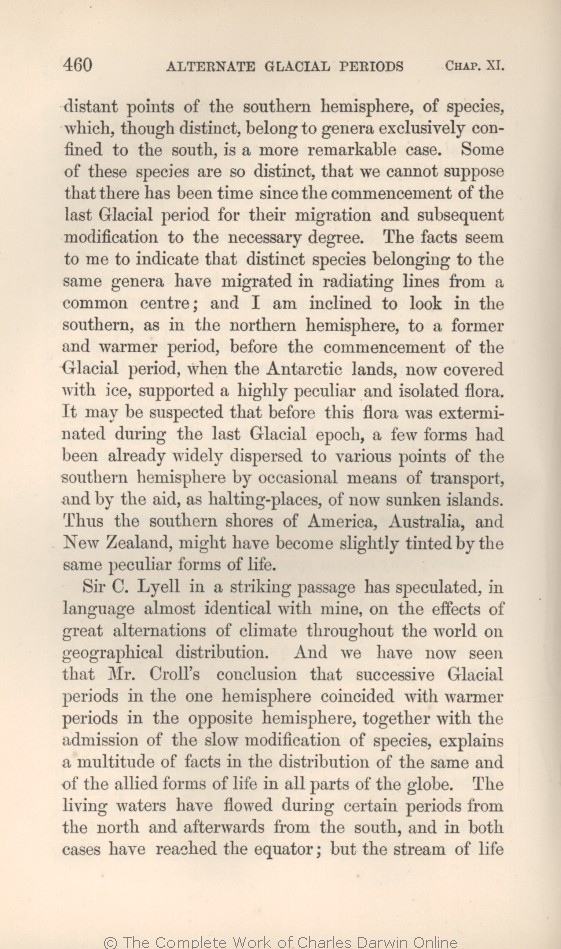at these and other distant points of the southern hemisphere,
of species, which, though distinct, belong to genera exclusively confined to the south, is a | of species, which, though distinct, belong to genera exclusively confined to the south, is a 1869 1872 |
| is, on my theory of descent with modification, a far 1859 1860 1861 |
| is, on the theory of descent with modification, a far 1866 |
| case. 1869 1872 | | case 1859 1860 1861 1866 |
| ..... 1869 1872 | | of 1859 1860 1861 1866 |
| ..... 1869 1872 | | difficulty. 1859 1860 1861 1866 |
| ..... 1869 1872 | | For 1859 1860 1861 1866 |
| Some 1869 1872 | | some 1859 1860 1861 1866 |
| last Glacial 1869 1872 | | Glacial 1859 1860 1861 1866 |
| migration 1869 1872 | | migration, 1859 1860 1861 1866 |
| ..... 1869 1872 | | for their 1859 1860 1861 1866 |
| me to 1859 1860 1861 1866 1869 | me to 1872 |
| OMIT 1869 1872 |
| peculiar and very 1859 1860 1861 1866 |
| belonging to the same genera have 1869 1872 |
| have 1859 1860 1861 1866 |
| a 1869 1872 | | some 1859 1860 1861 1866 |
| Glacial 1859 1860 1861 1866 1869 | | last Glacial 1872 |
| Antarctic 1869 1872 | | antarctic 1859 1860 1861 1866 |
| It may be 1869 1872 |
| I 1859 1860 1861 1866 |
| suspected 1869 1872 | | suspect 1859 1860 1861 1866 |
| during 1869 1872 | | by 1859 1860 1861 1866 |
| last Glacial 1869 1872 | | Glacial 1859 1860 1861 1866 |
| had been already 1869 1872 |
| were 1859 1860 1861 1866 |
| aid, 1859 1860 1861 1866 1869 | | aid 1872 |
| ..... 1866 1869 1872 | | existing and 1859 1860 1861 |
| islands. 1860 1861 1866 1869 1872 | | islands, 1859 |
| ..... 1860 1861 1866 1869 1872 | | and 1859 |
| ..... 1860 1861 1866 1869 1872 | | perhaps 1859 |
| ..... 1860 1861 1866 1869 1872 | | at 1859 |
| ..... 1860 1861 1866 1869 1872 | | the 1859 |
| ..... 1860 1861 1866 1869 1872 | | commencement 1859 |
| ..... 1860 1861 1866 1869 1872 | | of 1859 |
| ..... 1860 1861 1866 1869 1872 | | the 1859 |
| ..... 1860 1861 1866 1869 1872 | | Glacial 1859 |
| ..... 1860 1861 1866 1869 1872 | | period, 1859 |
| ..... 1860 1861 1866 1869 1872 | | by 1859 |
| ..... 1860 1861 1866 1869 1872 | | icebergs. 1859 |
| Thus 1869 1872 |
| By these means, as I believe, 1859 1860 1861 1866 |
| and New Zealand, might have 1869 |
| New Zealand have 1859 |
| New Zealand, have 1860 1861 |
| and New Zealand, 1866 |
| and New Zealand, may have 1872 |
| become 1859 1860 1861 1869 1872 | | became 1866 |
| ..... 1869 1872 | | vegetable 1859 1860 1861 1866 |
|
Sir C. Lyell in a striking passage has speculated, in language almost identical with mine, on the effects of great alternations of climate
throughout the world on | throughout the world on 1869 1872 |
| on 1859 1860 1861 1866 |
| coincided 1869 | | coincide 1872 |
| 1 blocks not present in 1869 1872; present in 1859 1860 1861 1866 | | I believe that the world has recently felt one of his great cycles of change; and that on this view, combined with modification through natural selection, a multitude of facts in the present distribution both of the same and of allied forms of life can be explained.
|
| OMIT 1869 1872 |
| may be said to 1859 1860 1861 1866 |
| certain 1869 | | one short 1859 1860 1861 1866 | | one 1872 |
| periods 1869 | | period 1859 1860 1861 1866 1872 |
| afterwards from 1869 |
| from 1859 1860 1861 1866 |
| during another from 1872 |
| in both cases have reached 1869 1872 |
| to have crossed at 1859 1860 1861 1866 |
| equator; 1859 1860 1861 1866 1869 | | equator: 1872 |
| the stream of life has 1869 1872 |
| to have 1859 1860 1861 1866 |
|









